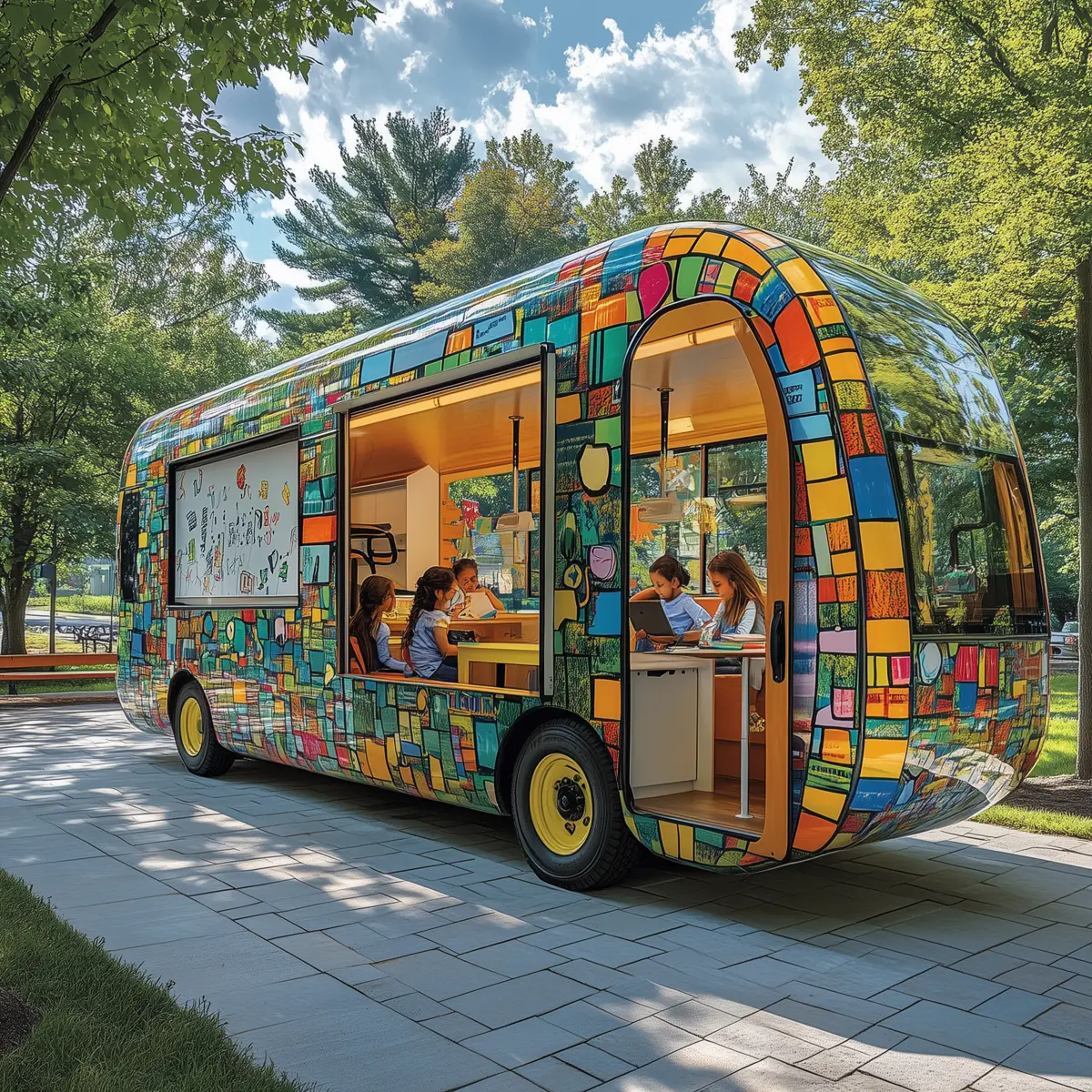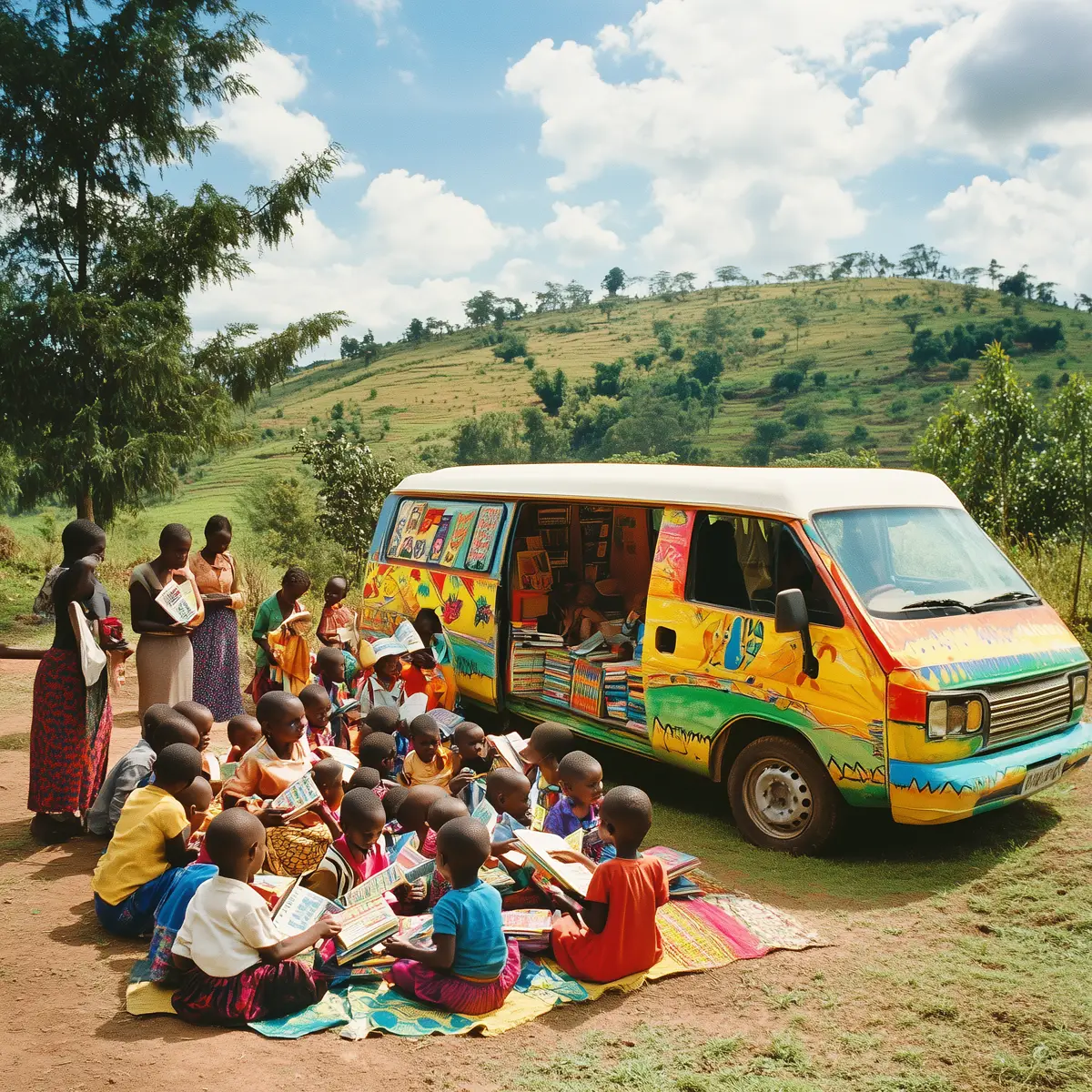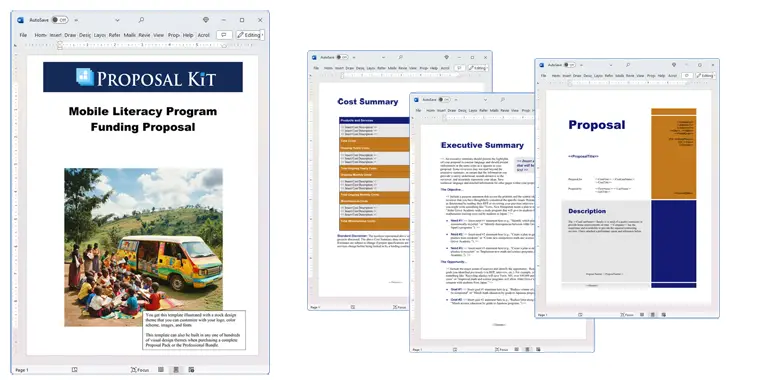How to write your Mobile Literacy Program Funding Proposal
We include this 21 page layout with every Proposal Pack. If you want this template to have a different visual design theme than the one illustrated here, purchase any Proposal Pack design and create this template using the purchased design theme. This template is included in every Proposal Pack. If you get a Proposal Pack or the Professional, you can also make any variation of this template with different chapters to suit your needs.
We typically include more chapters in the templates than most people will need to give everyone more variety in the chapters they may need. You can trim down a long template by removing pages you do not need or combining multiple chapter topics into one page.
 DOWNLOADABLE, ONE-TIME COST, NO SUBSCRIPTION FEES
DOWNLOADABLE, ONE-TIME COST, NO SUBSCRIPTION FEESYou can also create countless variations of this document to suit your needs using the included library of 2200+ chapters if ordering a Proposal Pack or Professional.
 What Our Clients Say
What Our Clients SayIt’s a great product for those who are new to proposal writing. Great templates that are easy to manipulate."
COO at Norris Professional Services, Incorporated
Related Article
Related Video
Related Templates
- Mobile Classroom Sales and Rental Proposal
- Mobile Services Proposal
- Outreach Center Funding Proposal
- Educational Grant Proposal #2
- STEM Educational Program Proposal
- Educational Grant Proposal
- Non-Profit Parenting Distance Learning and Workshop Proposal
- School Improvement Project Proposal
- Educational Training for Special Needs Proposal
- Distance Learning Education Proposal
- Womens Center Funding Proposal
- Non profit Support Proposal
- Community Center Funding Proposal
- Specialized Training Educational Proposal
- Homeless Womens Shelter Non Profit Funding Proposal
- Community Self Reliance Initiative Proposal
- Standard of Living Improvement Proposal
- Non Profit Parenting Distance Learning and Workshop Proposal
- Business Funding Proposal Template
- Online School and Media Outlet Funding Proposal
What's the best way to write your mobile literacy program funding proposal?
A proven solution for creating a mobile literacy program funding proposal is to use the Proposal Kit template and software package. This toolkit streamlines the proposal creation process and incorporates a comprehensive line item quoting database system. This feature is crucial for handling cost summaries, quotes, estimates, budgets, and other financial components important to your funding proposal.
Are you tasked with writing a proposal for a mobile literacy initiative and need help figuring out where to start? The Proposal Kit is the resource you need.
What Types of Projects Are Mobile Literacy Program Funding Proposal Written For?
Mobile literacy program funding proposals are typically created to support initiatives to improve literacy through mobile solutions. Here are various projects that benefit from such proposals:
- Mobile libraries serving rural areas
- Digital literacy workshops on wheels
- Bookmobile services for underserved communities
- Mobile app development for literacy education
- Van-based literacy tutoring programs
- Mobile technology training for seniors
- Outreach programs for migrant workers' education
- Literacy podcast series production and distribution
- Educational resource mobile distribution
- Mobile classrooms for refugee camps
- E-book distribution initiatives
- Literacy game development for mobile platforms
- Mobile assessment services for learning disabilities
- Traveling children's book festivals
- Mobile literacy training for homeless populations
- Virtual reality literacy experiences
- Mobile writing workshops
- Literacy integration in mobile health clinics
- Multilingual literacy app rollout
- Mobile literacy volunteer coordination
Chapters this template is built with
Creating a mobile literacy program funding proposal requires a tailored approach, as no single template fits every scenario. Proposal Kit software allows you to customize templates from an extensive library, ensuring all your specific needs are addressed. Here's how you might use some of these chapters:
Cover Letter
Introduce your organization and briefly outline your proposal's key points, establishing a personal connection with the funder. Highlight your commitment to improving literacy rates and briefly mention the unique topics of your mobile literacy initiative that set it apart from traditional programs. Use this space to engage the reader's interest and convey your passion for the project.
Executive Summary
Summarize the main topics of your mobile literacy project, highlighting the impact and the funding requirements. Clearly state the goals of your program, such as increasing literacy rates by a certain percentage or reaching a specific number of individuals. Provide a snapshot of how the funding will be used and the anticipated outcomes, ensuring the summary is concise and compelling.
Funding Plan
Detail your strategy for securing funds, including timelines and potential funding sources. Explain how you plan to approach various stakeholders, such as government agencies, private donors, and community organizations. Include a phased funding plan that outlines short-term and long-term financial strategies, ensuring transparency and accountability.
Staffing
Explain your team's qualifications and their roles in the project's execution. Highlight the expertise and experience of key team members, particularly those with backgrounds in education, logistics, and community outreach. This section should reassure funders that the project is in capable hands and that the team is well-prepared to implement the program successfully.
Project Background
Provide context about your organization's work and past successes in literacy initiatives. Share relevant statistics, case studies, and testimonials demonstrating your organization's impact on improving literacy. This background information helps to establish your credibility and track record in delivering effective literacy programs.
Service Area
Describe the geographic area and demographics of the community you aim to serve. Use data to illustrate the target population's literacy challenges, such as low literacy rates, high dropout rates, or lack of access to educational resources. This section should convey a deep understanding of the community's needs and how your mobile literacy program will address them.
Languages
List the languages your mobile literacy project will accommodate to ensure inclusivity. Explain how the program will cater to multilingual populations by offering materials and instruction in multiple languages. Highlight partnerships with local language experts or translators to ensure accurate and effective communication.
Literacy
Discuss the literacy needs specific to your target community and how your project addresses them. Identify the key literacy skills the program will focus on, such as reading comprehension, writing, and digital literacy. Explain how the mobile topic of the program makes it uniquely suited to meet these needs by bringing resources directly to the community.
Mobile
Detail the mobile technology and infrastructure used in your literacy program. Describe the features of your mobile units, such as internet connectivity, digital learning tools, and adaptable spaces for different activities. Highlight how these mobile solutions offer flexibility and accessibility, making literacy education available to a broader audience.
Materials
Outline your educational materials, such as books, e-books, and learning modules. Explain how these materials have been selected based on relevance, quality, and suitability for the target audience. Include information about partnerships with publishers, authors, or educational content providers to ensure a diverse and engaging curriculum.
Vehicles
Specify the type of mobile units, like buses or vans, that will be used to deliver literacy services. Detail how these vehicles will be equipped and maintained to ensure they are safe, reliable, and conducive to learning. Mention any customizations made to the vehicles to enhance their functionality, such as shelving for books, seating arrangements, and multimedia setups.
Community
Describe how the project will engage with the community and other stakeholders. Outline plans for community outreach, including partnerships with local schools, libraries, and community centers. Highlight any community events, workshops, or volunteer opportunities that will foster a sense of ownership and involvement in the project.
Sources of Funds
List all potential funding sources you plan to tap into for the project. Provide a diversified list of funding avenues, including grants, donations, sponsorships, and in-kind support. Explain how you will approach each source and the criteria to evaluate potential funders to ensure alignment with your project goals.
Uses of Funds
Break down how the funds will be allocated across different project areas. Provide a detailed explanation of each budget category, such as salaries, vehicle maintenance, educational materials, and marketing. Ensure that each expenditure is justified and directly tied to achieving the project's objectives.
Funding Request
State the total amount of funding you are requesting and justify the need for these funds. Provide a clear and compelling rationale for the funding request, linking it to the anticipated outcomes and impact of the project. Include any matching funds or additional resources your organization will contribute to demonstrate commitment and investment.
Project Budget
Provide a detailed budget that outlines expected costs and justifications for each line item. Break down the budget into personnel, operational expenses, and capital costs. Include contingency plans for unexpected expenses and explain how the budget will be monitored and adjusted as needed to ensure financial accountability.
Project Summary
Conclude with a strong summary that reiterates the project's importance and impact. Restate the proposal's key points, emphasizing the community's benefits of the mobile literacy program. End with a call to action, encouraging the funder to support your initiative and invest in the future of literacy education.
Education
Detail the educational outcomes you anticipate from the project. Specify the metrics you will use to measure success, such as improved literacy rates, increased enrollment in literacy programs, and positive participant feedback. Explain how these outcomes will be tracked and reported to funders to demonstrate the effectiveness of the project.
Use cases for this template
Expanding Horizons Through Mobile Libraries
The Challenge
Sophia noticed that rural areas in her community had low literacy rates due to limited book access. She works for Bright Futures Mobile Library. The lack of public libraries and educational resources in these remote locations hindered people's ability to improve their reading skills, leaving them disadvantaged in educational and professional settings.
The Solution
Sophia used the Proposal Kit to create a detailed funding proposal, emphasizing the need for a mobile library. She highlighted the significant resource gap and how a mobile library could bridge this divide. The proposal included evidence-based research showing the correlation between book access and improved literacy rates, making a case for the project's necessity.
The Implementation
She customized the Service Area, Materials, and Vehicles chapters to highlight how the mobile library could reach remote areas and provide valuable resources. Sophia detailed how the mobile library would operate, including the types of books and digital materials it would carry, the schedule of visits to various communities, and the outreach programs it would implement. This thoroughness demonstrated her deep understanding of the community's needs.
The Outcome
The proposal was successful, securing substantial funding that helped launch several mobile library vans. As a result, literacy rates in rural areas began to improve significantly. Community members had access to a broad range of books and educational materials, increasing their learning opportunities. The mobile library also became a community hub, fostering a culture of reading and education.
Digital Literacy for the Elderly
The Challenge
James, who works for TechHelp Initiative, identified a gap in digital literacy among seniors in his city. Many elderly residents struggle with digital devices, which affect their ability to communicate with family, access online services, and stay informed. This digital divide also isolates them from social activities and important information, making them more vulnerable.
The Solution
Using the Proposal Kit, James created a proposal focused on mobile training units for seniors. He underscored the importance of digital literacy for seniors, not only for their well-being but also for their safety and independence. The proposal articulated how digital skills could enhance their quality of life by enabling them to perform everyday tasks online, such as banking, shopping, and communicating with loved ones.
The Implementation
He tailored the Project Background, Languages, and Literacy chapters to showcase the project's inclusivity and educational impact. James described how the mobile units would be equipped with user-friendly technology and staffed by patient, knowledgeable instructors. The proposal also included plans for multilingual support to cater to the seniors' diverse linguistic backgrounds, ensuring no one was left behind.
The Outcome
The funding helped establish a well-equipped mobile digital literacy program. Seniors began to embrace technology, using it to stay connected with family and access vital services. The program significantly reduced feelings of isolation among the elderly community, and their newfound digital skills enhanced their overall well-being. The initiative was widely praised and even replicated in other cities.
Literacy Enhancement in Refugee Camps
The Challenge
Maria saw the urgent need for educational support in refugee camps. She is part of the Global Literacy Project. Refugee children and adults often lack access to formal education, resulting in low literacy rates and limited opportunities for personal and professional development. The transient nature of refugee life compounded these issues, making it challenging to provide consistent educational resources.
The Solution
Maria used the Proposal Kit to develop a comprehensive proposal for mobile classrooms in refugee camps. The proposal emphasized the need for education in these camps and outlined how mobile classrooms could offer flexible, adaptable learning environments. Maria vividly illustrated the life-changing impact of education, particularly for children who had experienced significant school disruptions.
The Implementation
She used chapters like Community, Funding Plan, and Education to detail the project's logistics and goals. The proposal described how the mobile classrooms would be set up, the curriculum offered, and the qualifications of the teachers. Maria also included a detailed funding plan, showing the costs involved and how the funds would be used to maximize impact.
The Outcome
Her effective proposal secured funding that facilitated the deployment of mobile classrooms. These classrooms provided a stable learning environment for refugee children and adults, significantly improving literacy rates and offering hope for a better future. The project educated individuals and helped build community and resilience among the refugees. This model became a benchmark for similar initiatives worldwide.
Conclusions and Recommendations
Proposal Kit software and templates provide a structured yet flexible foundation for creating targeted proposals for mobile literacy programs. Whether you're addressing rural literacy, digital education for seniors, or educational support for refugees, Proposal Kit equips you with the tools to articulate your mission, strategy, and financial needs clearly.
Also Known As
This template may also be referred to in different ways or be used in more specialized situations, such as:
- Mobile Literacy Funding Request
- Proposal for Mobile Reading Programs
- Mobile Education Support Bid
- Funding Application for Literacy Outreach
- Mobile Teaching Initiative Proposal
- On-the-Go Literacy Project Proposal
- Rolling Literacy Support Request
- Nomadic Education Funding Proposal
- Mobile Learning Solutions Proposal
- Roaming Literacy Program Proposal
Abstract
 The landscape of literacy education necessitates innovative approaches, and mobile literacy programs stand at the forefront of this transformation. These initiatives are designed to promote literacy by increasing access to educational resources and engaging diverse communities. By using grant opportunities, organizations can develop proposed projects that cater to regions with limited access to traditional educational facilities. The integration of mobile libraries, digital literacy workshops, and multilingual literacy apps exemplifies how these programs address literacy challenges across various demographics, including youth, students, and seniors.
The landscape of literacy education necessitates innovative approaches, and mobile literacy programs stand at the forefront of this transformation. These initiatives are designed to promote literacy by increasing access to educational resources and engaging diverse communities. By using grant opportunities, organizations can develop proposed projects that cater to regions with limited access to traditional educational facilities. The integration of mobile libraries, digital literacy workshops, and multilingual literacy apps exemplifies how these programs address literacy challenges across various demographics, including youth, students, and seniors.
Community partnerships play a role in expanding the capacity of these programs, engaging school staff, library staff, and local stakeholders to conduct literacy activities that enhance academic performance. By collaborating with parents and caregivers, these programs create a supportive environment that fosters a culture of enjoyment and learning. The Proposal Kit provides a structured framework for assembling grant proposals, using complex document assembly and automated line-item quoting to streamline the proposal process.
Potential applicants are encouraged to meet deadlines and articulate their commitment to creating awareness and reducing educational risk in underserved areas. Through targeted funding strategies and proven methods, awarded projects can transform lives and empower learners by bringing educational opportunities directly to them, whether in summer outreach events or ongoing mobile literacy efforts. This approach not only bridges the educational divide but also enriches the world by nurturing informed connected communities.
 In the quest to advance literacy through mobile initiatives, community partnerships become important in enhancing program effectiveness and reach. By working closely with local organizations, educational institutions, and stakeholders, these programs can increase access to vital resources, ensuring that even the most marginalized populations are not left behind. The Proposal Kit serves as a valuable tool for organizations interested in creating compelling grant proposals, offering features like extensive content libraries and automated line-item quoting that facilitate the creation of tailored documents.
In the quest to advance literacy through mobile initiatives, community partnerships become important in enhancing program effectiveness and reach. By working closely with local organizations, educational institutions, and stakeholders, these programs can increase access to vital resources, ensuring that even the most marginalized populations are not left behind. The Proposal Kit serves as a valuable tool for organizations interested in creating compelling grant proposals, offering features like extensive content libraries and automated line-item quoting that facilitate the creation of tailored documents.
For eligible communities, the introduction of mobile literacy programs offers transformative opportunities. These initiatives not only focus on traditional literacy skills but also integrate math and digital literacy, equipping participants with a comprehensive skill set. Best practices in program implementation are shared among partners, allowing for the continuous refinement and success of these projects. By using mobile units and innovative teaching methods, these programs reach learners directly in their environments, breaking down barriers to education.
Such efforts encourage a culture of lifelong learning and curiosity, fostering environments where students, parents, and educators are all invested in positive educational outcomes. As a result, these projects do not merely improve literacy rates; they contribute to a broader vision of community empowerment, where individuals are better prepared to navigate and thrive in an increasingly complex world. Through planning and execution, these initiatives demonstrate the profound impact of well-conceived literacy programs on enhancing both individual lives and community resilience.
 In the field of education, mobile literacy programs stand out by using cutting-edge technology to extend learning opportunities beyond traditional settings. These programs use mobile classrooms and digital platforms to deliver educational content directly to learners, transcending geographical and logistical barriers. As a result, students who previously had limited access to quality educational resources now have the opportunity to engage with diverse learning materials and experiences.
In the field of education, mobile literacy programs stand out by using cutting-edge technology to extend learning opportunities beyond traditional settings. These programs use mobile classrooms and digital platforms to deliver educational content directly to learners, transcending geographical and logistical barriers. As a result, students who previously had limited access to quality educational resources now have the opportunity to engage with diverse learning materials and experiences.
The Proposal Kit assists organizations in articulating these innovative approaches within their grant proposals, offering a seamless way to assemble complex documents that highlight the unique topics of mobile literacy initiatives. By showcasing how these programs use mobile units to deliver not just reading and writing instruction but also interactive sessions in math and digital skills, proposals can demonstrate a holistic approach to education.
The positive impact of these programs is multi-faceted, fostering not only academic growth but also social development within communities. By creating spaces where learners of all ages can gather, these initiatives cultivate a sense of belonging and community spirit. This collaborative environment encourages participants to take ownership of their educational journeys, thereby instilling a lifelong appreciation for learning. Through these efforts, mobile literacy programs are not just educational interventions; they are catalysts for personal and communal transformation, paving the way for more informed and empowered populations.
Frequently Asked Questions
What are the key elements to include in a mobile literacy program funding proposal?
Start with a cover letter and executive summary to introduce the project's objectives and funding needs. Clearly outline your project background, detailing previous successes and the specific literacy challenges you aim to address. Include detailed sections on the service area, target demographics, and the types of mobile units you will use, such as buses or vans with educational materials. A thorough budget section should also be provided that breaks down costs and justifies the requested funding.
How do I demonstrate the impact of my mobile literacy program in the proposal?
Highlight the expected outcomes and benefits for the target community. Use specific data and studies to support your claims about the need for improved literacy. Include testimonials or case studies from similar projects that have increased literacy rates. Visual aids, such as graphs and charts, can help illustrate projected improvements in literacy skills. Be sure to outline a clear evaluation plan to measure the program's success and show funders how their investment will yield tangible results.
How do I justify the budget for a mobile literacy program?
Justifying your mobile literacy program funding proposal budget involves providing detailed cost breakdowns. Include vehicle acquisition or leasing line items, fuel, maintenance, staff salaries, educational materials, and technology. It is essential to explain why each expense is necessary and how it contributes to the overall success. Offering cost comparisons or quotes from vendors can add credibility. Additionally, highlighting any cost-saving measures or in-kind contributions from partners can demonstrate fiscal responsibility and make a case for your requested funding amount.
What can I do to make my mobile literacy program funding proposal stand out?
To make your mobile literacy program funding proposal stand out, focus on innovation and community impact. Showcase any unique topics of your program, such as the use of cutting-edge technology, partnerships with local organizations, or tailored services for underserved populations. Use a professional and visually appealing design to make the document readable. Personalize the proposal by addressing the funder's specific interests and priorities. Including success stories and testimonials can also add a human element that resonates with reviewers. Finally, ensure the proposal is clear, concise, and jargon-free to make a strong impression.
How do I address potential challenges in my mobile literacy program funding proposal?
Addressing potential challenges demonstrates foresight and preparedness, which can strengthen your mobile literacy program funding proposal. Identify obstacles, such as logistical issues, community resistance, or funding shortfalls, and outline mitigation strategies. For example, discuss contingency plans for vehicle maintenance or alternative funding sources to cover unexpected costs. Highlight any partnerships or collaborations that can provide additional support. Showing that you have considered and planned for challenges will reassure funders of your program's viability and ability to manage it.
20% Off Discount
![]() Add To Cart This Word Template
Add To Cart This Word Template
 Add To Cart Proposal Pack for Any Business
Add To Cart Proposal Pack for Any Business
 Add To Cart Proposal Kit Professional
Add To Cart Proposal Kit Professional
 4.7 stars, based on 849 reviews
4.7 stars, based on 849 reviewsProposal Kit chapters used in this template
Cover Letter, Title Page, Table of Contents, Executive Summary, Project Background, Literacy, Education, Mobile, Materials, Vehicles, Languages, Community, Service Area, Staffing, Project Budget, Funding Plan, Sources of Funds, Uses of Funds, Funding Request, Project Summary, Back Page
Line Item Automated Chapters
If you purchase a Proposal Pack or the Professional Bundle, these proposal pages are generated using an automated line-item database in the included Wizard software.
Funding Request, Project Budget
You use this proposal for
- General business proposal
- Education, training proposal
- Non-technical proposal
- Project pitch proposal
- Non-government grant, non-profit, NGO proposal
- Spiritual, church, community proposal
How to create this template with Proposal Pack Wizard
You can create this document using any of the logo-designed Proposal Packs. Pick any Proposal Pack with a logo design theme you like best; they will all work equally well. The Proposal Pack for Any Business is the pack with no extra added logos or colors - designed to be used plain or for you to customize with your logos and graphics.
The Proposal Pack design theme you purchase will determine the visual look of this template. The screenshot above only shows the plain generic design theme.
We include a library of chapters to be assembled based on your needs. All proposals are different and have different needs and goals. We designed Proposal Pack so you can customize the documents to suit your needs.
You will best create this document using the Proposal Pack Wizard - Expert Edition software to select this template and build it in the Proposal Pack logo design theme of your choice along with any desired customizations (such as adding additional chapters, removing unneeded chapters, changing the order of chapters, and importing your company logo). This template outlines a proposal for the described situation. Each user is responsible for typing in the actual content of the provided pages with their information to complete the proposal. Suggestions in the abstract may include features in higher-end packages and are facilitated by the selection of chapter templates to support the narrative of each proposal, which help guide the user in filling in the details.
The Wizard software's AI Writer will write the content of the pages of the template based on details provided for your company, client, project, financial details and other writing instructions. This will provide a personalized version of the template completely written and ready to edit.
Once finished, the AI Writer's Word-to-PowerPoint converter can transform your proposal, business plan, or other business documents into a PowerPoint slideshow. Save time and effort by letting the AI analyze every chapter to condense its content into talking points, visually matching the document, and providing a consistent package of presentation material with the click of a button.
You create this template using the Wizard software with an entire Proposal Pack library and software. We include the Expert Edition of the software in the Proposal Kit Professional. Microsoft Word for Windows is required to use the customizing software. You can also edit Word document templates in other office software such as Word for Mac. We will assist Mac users in assembling complex templates for their first project if they do not have the required platform to run the Wizard software.
How to Build Templates Featured on Proposal Kit Website
Many people find the Proposal Kit website after searching for a specific proposal. Once you've purchased and installed the software, how do you build that template you found in the first place? This video shows you how to build any proposal you see on the Proposal Kit website.
 Ian Lauder has been helping businesses write their proposals and contracts for two decades. Ian is the owner and founder of Proposal Kit, one of the original sources of business proposal and contract software products started in 1997.
Ian Lauder has been helping businesses write their proposals and contracts for two decades. Ian is the owner and founder of Proposal Kit, one of the original sources of business proposal and contract software products started in 1997.By Ian Lauder
 Published by Proposal Kit, Inc.
Published by Proposal Kit, Inc.


 Cart
Cart
 Get 20% off ordering today:
Get 20% off ordering today: 


 Facebook
Facebook YouTube
YouTube Bluesky
Bluesky Search Site
Search Site